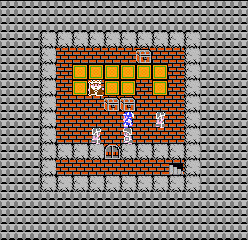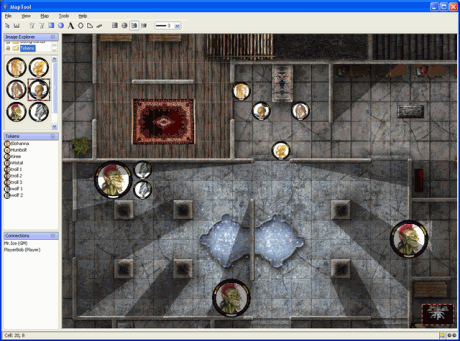Yet, for all these attempts at simulating the D&D experience, few have come close. The majority have focused on single-player narratives which, as fun as some of these are, seems to entirely miss the appeal of the tabletop genre. How many of you have played D&D or any other tabletop RPG? How many have played these games alone? Almost none, right? The vast majority of these games' appeal comes from their social nature.
The closest any game has come to capturing this experience, so far, has been the original Neverwinter Nights. Ironically, this essentially D&D game's attempt is imperfect, in my opinion, because it sticks to closely to its pen and paper roots. Instead of taking the experience and adapting it into a digital medium, it makes a literal translation of the source material. There has yet to be a title that utilizes interactive media to its full advantage in creating this style of game.
Thus, one of the game concepts I've been playing around with for a long time is one of a console based RPG done in a "tabletop" style. That is to say a CRPG that plays like Dungeons & Dragons, WFRP, etc. While I have a prototype of such a title as a work in progress, it's quite far from any publishable state. But what would such a title entail?
Well, for illustrative purposes, let's have a look at a possible menu tree:
Adventurer
- -Solo Campaign
- -Load Solo Adventure
- -Find an Adventure
- -Find a Campaign
Dungeon Master
- Adventure Editor
- Campaign Editor
- Host an Adventure
- Host a Campaign
Community Created Content
- Adventures
- Campaigns
Options
(edit: There was some confusion, but the intent here was to imply nested menu options, going from one screen to another. The list has been reformatted to reflect this better. Thanks NINJ4KYL3.)
So, what he have here shows the gist of the game. What we have is a title that allows users to take on one of two active roles, that of an "adventurer" or a "dungeon master." The former's role is that of the traditional player character, while the latter is that of a host, amateur designer, and nemesis to the players. This is the essential element of the tabletop game.
As the adventurer's role is the easiest, we'll take a quick look at that first before getting into more detail in another post. The options under this menu include playing the game's default solo campaign, loading a custom adventure they have downloaded, or seeking out either a short term adventure or long term campaign online. It becomes important, here, to define the terms "adventure" and "campaign." An "adventure" is a relatively short, single session, self contained quest. A level, basically, akin in scale to what one might design for Little Big Planet. A "campaign" is a larger set of linked adventures, with characters and rules that persist across adventurers and game sessions. An adventure is basically a pick up and play scenario, where a campaign will be designed for a single host to run a long term game for a constant group of players, possibly over the course of many game sessions. (More on this later)
The game's built-in solo campaign would be relatively short, simple, and archetypal, intended primarily to introduce new players to the game's mechanics and to provide a modicum of offline utility to the title. In this, the player would be able to choose a single one of the player classes and play through a rather traditional little RPG storyline on their own.
The "Load Solo Adventure" menu would lead to a menu allowing the player to load any of a number of community created solo adventures made by themselves or others from the Dungeon Master menu.
The "Find Adventure" menu would lead a player to a familiar game lobby browser, wherein they can browse and enter a multiplayer adventure lobby hosted by another player. From the browser, the player may be able to see information such as the adventure and lobby name, host, number of players, number of players requested, and the average rating of the adventure. Essentially, it should appear to be a combination of a multiplayer game browser and a custom content browser. Once in a unique lobby, the players and host will be able to converse via microphone or text chat and choose their characters.
For Dungeon Mastering, we have a somewhat more varying set of menus.
The "Adventure Editor" is where a great deal of the Game Mastering gameplay will take place. This will function as a traditional grid-based map editor, where the player can design the adventure's terrain, place decor, and NPCs. The game will take place from a top-down perspective, with grid based construction. This will allow the player to construct entirely standalone games, allowing non-hosted play. (More on this in its own post, as this is really the heart of the experience.)
The "Campaign Editor" allows a player to compile multiple adventures into a single campaign and define the properties of that campaign.
The "Host an Adventure" menu allows the player to do just that. The host, or "Dungeon Master," does not remain complacent, however, as he retains the full breadth of his editorial power as the game takes place. He may drop in new enemies in for an ambush; manipulate, even kill, characters and terrain instantly as the narrative demands, rather than the literal on-screen actions of the players; reveal hidden passages, etc. at will. He may even choose to construct the adventure as the players go. If the DM likes, he may save such changes at the end of the game. Think Halo's "Forge." Furthermore, he may choose to fully take on the traditional role of the DM, narrating, roleplaying NPCs, and engaging the players in roleplay. It remains the hosts choice weather he runs a silent hack-n-slash Gauntlet style game, a session of deep role-play, or a little of both.
The "Host a Campaign" menu will be largely similar to that of the adventure, save for having the additional functions necessary for longer term games. Key here is that, after the initial run, characters will sustain across sessions. Imagine playing a game of Little Big Planet, when someone gets a call. Rather than ending the game, the players may choose to collectively save and pick up right were they left later on.
And, finally, we have a couple of unspecific menus.
The "Community Created Content" menu will allow players to browse custom adventures, campaigns, and possibly other content created and uploaded by other players.
So, thoughts?



The one thing that CRPGs cannot do -- yet -- that TTRPGs can do is freedom of action. While level editors and online gaming can largely replicate much of the social interaction and world building, your character would still be constrained by the possible actions available in the game.
ReplyDeleteIn D&D or other TTRPGs the DM can allow any sort of action because his or her brain is far stronger than a given (current) computer. He or she can think of the logical result of that action and how it would best be represented via game mechanics. It would be quite difficult to imagine a CRPG that would allow players to ask any question they could come up with and not to receive one of a series of regenerated answers. The amount of coding it would take to represent the complete freedom of action necessary to simulate D&D is beyond the ken of mortals.
Still, I think your idea has a lot of merit. Would I play such a game? Absolutely. Would it replace D&D for me? Fuck no.
When I get into the DMing side of this, I'll show my hand on handling such things. Like I kind of hinted at in this intro section - the plan would be to allow for such things. A simply skill system would allow players to roll for things not explicitly represented by game mechanics. If the player has a creative idea for killing a foe - the GM can simply click on the enemy and insta-kill him. Roleplay would, of course, be a simple matter of conversation. Yes, the majority of the game's explicit mechanics will deal with exploration and combat, but that's also true of any tabletop RPG.
ReplyDeleteThat's the goal - take what a tabletop RPG's rules provide for a group of players and put it in CRPG form, without placing any restrictions. Be a resource, a tool. At the end of the day, this won't have mechanics for personalities or seducing the priestess, but that's what the fleshy people behind the controllers are for. The game itself just seems like something that really should have existed years ago.
Any of those "it can't replace D&D because of X" issues, however, I'd really LOVE people to post in the comments. Addressing such issues is the primary design goal of this project.
ReplyDeleteI'd just like to say I love what you are thinking as far as the control that you want to give both the players and the DM's but my problem is the fact that it seems you are just spewing this idea out without anyway of producing it. Like Evan said, there is alot that you want this software to do, but limited space in which to do it on a video game system like PS3 or XBOX. For the following reasons.
ReplyDelete1. Limitation on controls based on the numbers of buttons on the controlers. (What Evan was trying to say)
2. Limitation of the processors and internet connections of the system. (The speed of the software would wear out the damn thing, once again like Evan was trying to say.)
3. Customizeable content is great, but there is limited memory space. You would have to set up a whole online comunity dedicated to this game.
4. D&D has changed alot... there are HUNDREDS of rule and i don't think that players would be able to follow along as easily, you would be limiting the number of people your product would relate to.
~more to say~
5. Forgetten Realms and its games have gotten pretty darn close to what the players want, the only other option is D&D online, where the world has turned into a more WOW style game.
ReplyDelete6. To be able to customize your character to it's entireity you would need to ahve alot of the systems that NWN already has in place. The ablity to import your own images and write your own backstory.
7. What kind of graphics are you trying to use? 2D? Like a flash game? Do you know how much that would limit your programing?
8. If you want to create a game based off D&D you have to follow at least some of the rules, or rewrite them completely, and if you do that then you'll just be like plenty of other Dice based games.
9. Your main menu has way to many options on it. You should narrow it down by splitting them into catagories, or slipping one general subject under another. (Like: Putting all the options that send you to find files on the internet under one button.
I don't know, I don't mean to rag on you. I know you are just spurting off theories but there is alot to set up in a D&D based game. So many rules, and so many unpredictabilities. All other games are simple by comparison. If you want to build a completely imersing RP it's going to take time, a LOT of time. It won't be as simple as saying, we can just do this, this, and this.
Someone essentially assist to make severely posts I might state.
ReplyDeleteThis is the first time I frequented your website page and thus far?
I surprised with the analysis you made to make this particular post extraordinary.
Great job!
Also visit my blog post - easiest way to lose weight